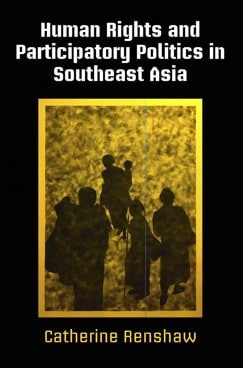 Human Rights and Participatory Politics in Southeast Asia, Catherine Renshaw (Philadelphia: University of Pennsylvania Press, 2019), 256 pp., $75 cloth, $75 eBook.
Human Rights and Participatory Politics in Southeast Asia, Catherine Renshaw (Philadelphia: University of Pennsylvania Press, 2019), 256 pp., $75 cloth, $75 eBook.
In 2007, the ten member countries of the Association of Southeast Asian Nations (ASEAN) signed the ASEAN Charter and subsequently, in 2009, created the ASEAN Intergovernmental Commission on Human Rights. One of the goals in taking such a regional approach was these countries’ desire to limit the hegemonic imposition of supposedly universal norms and values by Western nations. In Human Rights and Participatory Politics in Southeast Asia, Catherine Renshaw examines both the effectiveness and shortcomings of these ASEAN initiatives. She explores whether and how different types of political regimes can have an impact on the rights of individuals—indeed, Southeast Asia is home to a wide range of governments including the Communist regimes of Vietnam and Laos, the Islamic sultanate of Brunei, the constitutional monarchy of Thailand, and the multiparty democracies of the Philippines and Indonesia. Throughout the first part of the book, the author contends that the lack of democratic principles and traditions in the region have in part led to enforcement and oversight weaknesses. Because of these flaws, she maintains that ASEAN can sometimes lack legitimacy in the eyes of global leaders.
Throughout the first part of the book, the author contends that the lack of democratic principles and traditions in the region have in part led to enforcement and oversight weaknesses. Because of these flaws, she maintains that ASEAN can sometimes lack legitimacy in the eyes of global leaders. In the second part of the book, the author discusses ASEAN’s handling of case studies in three categories of human rights—women’s rights, human trafficking, and the ongoing Rohingya crisis in Myanmar—as well as whether a global or regional approach was used.
In terms of women’s rights, while there have been some advancements over the years, such as ASEAN adopting the Declaration on the Elimination of Violence against Women in the ASEAN Region in 2004, there remains a lack of specific initiatives to eliminate prejudice and promote gender equality. Renshaw notes that international standards are more effective in this area, as the UN declarations have provided much clearer outlines and oversight than the regional ones put out by ASEAN. In contrast, Renshaw views the regional response to human trafficking as more effective than the UN protocol on human trafficking. She explains that this is in large part because ASEAN states had their own strong motives to tackle this issue, as it presented major risks to state security and stemmed from their direct regional knowledge of the trafficking problems at stake. Lastly, her Myanmar example highlights the limitations of ASEAN in truly influencing the internal politics of a member state. Even though Myanmar’s fellow ASEAN members have vocally opposed the atrocities against the Rohingya population, they have had virtually no enforcement mechanism to effect change. This section illustrates that ASEAN follows more of a lead-by-example mindset than one of strict institutional implementation.
Renshaw’s book provides a solid overview of Southeast Asian political systems, values, and global relations. It is not an exhaustive account of all ASEAN nations; rather, the text plants a seed that readers with fixed interests can use to jump-start a deep-dive exploration into a specific country. The author does not present a black-and-white conclusion as to which human rights policy approach—international or regional—is best, but rather challenges readers to look at both approaches from different angles, allowing them to formulate new perspectives. Human Rights and Participatory Politics in Southeast Asia is an important contribution to understanding the difficulties of achieving effective adherence to human rights principles in the region and provides an analytical model with which to approach similar challenges in other parts of the world.
More in this issue
Fall 2020 (34.3) • Review
Global Poverty, Injustice, and Resistance
In this work of nonideal theory, Gwilym David Blunt flips the existing narrative on ethics and extreme poverty by examining the global poor’s right ...
Fall 2020 (34.3) • Review
Why Nationalism
Yael Tamir’s Why Nationalism is a very good, very timely, and very unfashionable book.
Fall 2020 (34.3) • Review
Structural Injustice: Power, Advantage, and Human Rights
This is an urgently needed book. Madison Powers and Ruth Faden have constructed a powerfully reasoned, deeply learned, and richly perceptive theory that places the ...